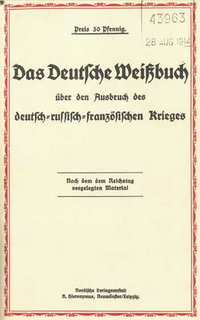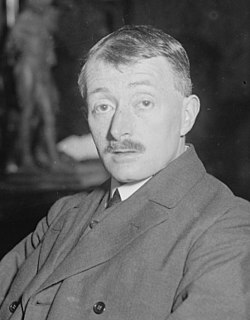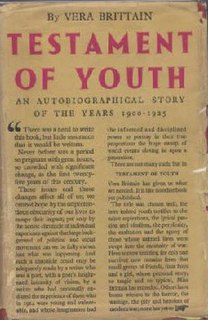 W
WCastles of Steel: Britain, Germany, and the Winning of the Great War at Sea is a work of non-fiction by Pulitzer Prize-winner Robert K. Massie. It narrates the major naval actions of the First World War with an emphasis on those of the United Kingdom and Imperial Germany. The term "castles of steel" was coined by the British First Lord of the Admiralty Winston Churchill in reference to the large number of the Royal Navy's battleships he saw at Spithead in 1914.
 W
WChurchill, Hitler and the Unnecessary War: How Britain Lost Its Empire and the West Lost the World, is a book by Patrick J. Buchanan, published in May 2008. Buchanan argues that both world wars were unnecessary and that the British Empire's decision to fight in them was disastrous for the world. One of Buchanan's express purposes is to undermine what he describes as a "Churchill cult" in America's élite and so he focuses particularly on how Winston Churchill helped Britain get into wars with Germany in 1914 and again in 1939.
 W
WDie Pariser Friedenskonferenz 1919 und die Friedensverträge 1919—1920. Literaturbericht und Bibliographie, is a book published in 1970 by the German librarian and historian Max Gunzenheuser; it is a special bibliography of the Paris Peace Conference that contains about 2300 sources published during the preceding 50 years.
 W
WDreadnought: Britain, Germany, and the Coming of the Great War (1991) is a book by Robert K. Massie on the growing European tension in decades before World War I, especially the naval arms race between Britain and Germany. A sequel, covering the naval war between Germany and Britain, Castles of Steel: Britain, Germany, and the Winning of the Great War at Sea was published in 2004.
 W
WThe First Day on the Somme (ISBN 0-14-139071-9) is a First World War military history book by Martin Middlebrook, first published in 1971 and still in print, which is regarded as a seminal work in the field of World War I scholarship reflecting England's perspective in the conflict. Its text covers in detail the events leading up to and during 1 July 1916, the first day of the Battle of the Somme, concentrating almost exclusively on the British Army's experiences and focussing only in relief on French Army's contribution, especially south of the Somme River.
 W
WForgotten Voices of the Great War is a collection of interviews with people who lived through the First World War.The book is part of the Imperial War Museum's oral archive.
 W
WThe German White Book was a publication by the German government of 1914 documenting their claims for the causes of World War I.
 W
WGermany's Aims in the First World War is a book by German Historian Fritz Fischer. It is one of the leading contributions to historical analysis of the causes of World War I, and along with this work War of Illusions (Krieg der Illusionen) gave rise to the "Fischer Thesis" on the causes of the war. The title translates as "Grab for World Power". or "Bid for World Power". Essentially Fischer attempts to link together a continuum of German belligerence in their "grab for power" weaving it all together into a cohesive theme of German Weltpolitik.
 W
WGood-Bye to All That is an autobiography by Robert Graves which first appeared in 1929, when the author was 34 years old. "It was my bitter leave-taking of England," he wrote in a prologue to the revised second edition of 1957, "where I had recently broken a good many conventions". The title may also point to the passing of an old order following the cataclysm of the First World War; the supposed inadequacies of patriotism, the interest of some in atheism, feminism, socialism and pacifism, the changes to traditional married life, and not least the emergence of new styles of literary expression, are all treated in the work, bearing as they did directly on Graves' life. The unsentimental and frequently comic treatment of the banalities and intensities of the life of a British army officer in the First World War gave Graves fame, notoriety and financial security, but the book's subject is also his family history, childhood, schooling and, immediately following the war, early married life; all phases bearing witness to the "particular mode of living and thinking" that constitute a poetic sensibility.
 W
WThe Guns of August (1962) is a volume of history by Barbara W. Tuchman. It is centered on the first month of World War I. After introductory chapters, Tuchman describes in great detail the opening events of the conflict. Its focus then becomes a military history of the contestants, chiefly the great powers.
 W
WIn Flanders Fields: The 1917 Campaign is a history of the Third Battle of Ypres by Leon Wolff, published in 1958, with an introduction by Maj. Gen. J. F. C. Fuller, CB, CBE, DSO. In 1960, Readers Union Ltd published an edition produced by Longmans, Green & Co. for sale to its members only. In 1963, a re-edition of the book was included in the Time-Life Reading Program, with an additional introduction by B. H. Liddell-Hart. In 1979, a Penguin Books edition was published "with minor emendations". Based on this, in 2003 Cambridge University Press published a "Folio Society" edition.
 W
WInfantry Attacks is a classic book on military tactics written by Erwin Rommel about his experiences in World War I. At the time of the book's writing in the mid-1930s, Rommel's rank was lieutenant colonel. Rommel had planned to write a successor called Panzer greift an about tank warfare, and gathered much material during the North Africa Campaign. However, he was forced to commit suicide before completing this work.
 W
WMen of Letters: The Post Office Heroes who Fought the Great War is a book by Duncan Barrett, co-author of The Sugar Girls and GI Brides and editor of The Reluctant Tommy. It was published by AA Publishing on 1 August 2014 and officially launched on 4 August to marked the hundredth anniversary of Britain's declaration of war.
 W
WThe Official History of New Zealand's Effort in the Great War is a four-volume 'Popular History' series which covered the New Zealand involvement in the First World War. Aimed at presenting the efforts of the New Zealand Military Forces during the war to the general public, the series was published during the period 1919 to 1923.
 W
WThe Old Front Line (ISBN 0-85052-936-0) is a military history book by English poet John Masefield, first published in 1917.
 W
WOrdered to die: a history of the Ottoman army in the First World War is an account of the Ottoman Empire's military engagements in World War I, fought between the Allies and the Central Powers. It was written by Edward J. Erickson. It was divided into seven sections beginning prewar military issues.
 W
WPeacemakers: The Paris Peace Conference of 1919 and Its Attempt to End War (2001) is a historical narrative about the events of the Paris Peace Conference of 1919. It was written by the Canadian historian Margaret MacMillan with a foreword by American diplomat Richard Holbrooke. The book has also been published under the titles Paris 1919: Six Months That Changed the World and Peacemakers: Six Months That Changed the World.
 W
WThe Red Fighter Pilot is a book written by Manfred von Richthofen, a famous German fighter pilot who is considered the top scoring ace of the First World War, being officially credited with 80 air combat victories. Richthofen's most common German nickname was "Der Rote Kampfflieger," which roughly translates to "The Red Battle Flyer" or "The Red Fighter Pilot." Today he is better known as the Red Baron.
 W
WRussia Leaves the War (1956) is a Pulitzer Prize-winning book by George F. Kennan, which won the 1957 Pulitzer Prize for History, the 1957 National Book Award for Nonfiction,the 1957 George Bancroft Prize, and the 1957 Francis Parkman Prize. The first of two volumes discussing Soviet-American relations from 1917–1920, it covers the Russian Revolution of 1917 and the departure of Russia from World War I in 1918. The second volume, The Decision to Intervene (1958) explores U.S. involvement in Siberia.
 W
WSeven Pillars of Wisdom is the autobiographical account of the experiences of British soldier T. E. Lawrence, while serving as a liaison officer with rebel forces during the Arab Revolt against the Ottoman Turks of 1916 to 1918.
 W
WSomme (ISBN 0-7181-2254-2) is a First World War military history book by Lyn MacDonald, published in 1983 by Michael Joseph.
 W
WTestament of Youth is the first instalment, covering 1900–1925, in the memoir of Vera Brittain (1893–1970). It was published in 1933. Brittain's memoir continues with Testament of Experience, published in 1957, and encompassing the years 1925–1950. Between these two books comes Testament of Friendship, which is essentially a memoir of Brittain's close colleague and friend Winifred Holtby. A final segment of memoir, to be called Testament of Faith or Testament of Time, was planned by Brittain but remained unfinished at her death.
 W
WThe World Crisis is Winston Churchill's account of the First World War, published in six volumes. Published between 1923 and 1931: in many respects it prefigures his better-known multivolume The Second World War. The World Crisis is analytical and, in some parts, a justification by Churchill of his role in the war. Churchill is reputed to have said about this work that it was "not history, but a contribution to history".